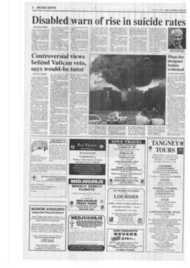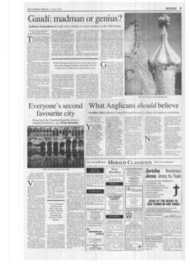Page 2, 13th July 2001
Page 2

Report an error
Noticed an error on this page?If you've noticed an error in this article please click here to report it.
Tags
Share
Related articles
Loneliness Can Be One Of The Great Dangers
Resist Suicide Law Changes, Archbishop Urges Faithful
Fight For Disabled
Helping Disabled To Live In Dignity At Home
Suicide And Diminished Responsibility
Disabled warn of rise in suicide rates
By Tracey-Jo Smith
CAMPAIGNERS have predicted a rise i he number of suicide.,,.ong disabled people Ii gc -nment plans to test the sick aid the infirm to see if they are fit for work, go ahead without any changes.
Alistair Darling, Secretary of State for Work and Pensions, has unveiled proposals to reform the benefit system, which critics claim are harsh and point out were announced as MPs voted to increase their own salaries by £24,000.
The move, which has been described as "an MOT system" has provoked fury from disabled rights groups, including those within the Catholic Church.
Ann Stevens-Bevan, voted Catholic Woman of the Year in 1999 and Welfare Officer for Dyfed Disability Rights Bureau, said:" I am absolutely disgusted. I turn 60 in a few weeks time and my incapacity benefit will be reduced" Mrs Stevens-Bevan, who has cared for her ill husband for 38 years out of their 39year marriage, added that disabled people were being treated no better than "farm animals".
Many among the disabled community have accused the Government of hypocrisy, given the Labour Party's traditional commitment to social justice.
Mrs Stevens-Bevan said: "The Labour Party has become the Tory Party unmasked. This is not a caring party. Tony Blair wants to be president of the world".
Backbenchers within the Labour Party have already made known their opposition to any reform, threatening a rebellion, reminiscent of the revolt of benefit reforms two years ago.
Under the plans, the 2.3 million people claiming incapacity benefit would have their awards granted for a fixed term of three years or less, instead of indefinitely.
When the term was up, the claimant would have to be re-assessed.
Government Ministers and advisers suspect that 400,000 people, who are currently receiving benefit could return to work if they were given the proper support.
Mrs Stevens-Bevan expressed concern for the families of those who were disabled. She said the proposed measures would affect the household income. The measures were not only unfair, but Draconian, she said.
"Are we going to go down the road Hitler took during the war?", she asked.
She also claimed that the status of disabled people appeared to have diminished in the national consciousness, noting that not one of the political parties mentioned the disabled during the general election last month.
Rachel Hurst, a director of Disability Awareness in Action, said that those who would be particularly badly hit by the changes were those with invisible disabilities, such as the mentally ill and epilepsy sufferers.
Driven to despair, she believes that many disabled people will take their own lives. She said also that campaign groups will take to the streets to protest against the reforms.
blog comments powered by Disqus













